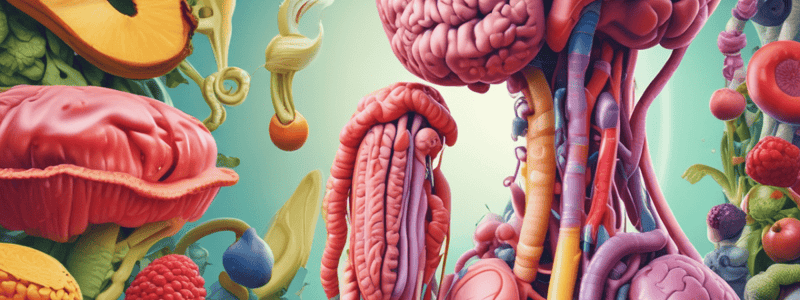Podcast
Questions and Answers
Which organ plays a key role in transforming absorbed nutrients and removing toxic chemicals?
Which organ plays a key role in transforming absorbed nutrients and removing toxic chemicals?
- Gallbladder
- Liver (correct)
- Pancreas
- Stomach
Where are feces formed in the digestive system?
Where are feces formed in the digestive system?
- Stomach
- Small intestine
- Large intestine (correct)
- Esophagus
What is the primary role of bacteria in the large intestine?
What is the primary role of bacteria in the large intestine?
- Neutralizing stomach acid
- Producing enzymes for digestion
- Absorbing water from food
- Breaking down carbohydrates and proteins into simpler molecules (correct)
Which of the following is NOT mentioned as a way to keep the digestive system healthy?
Which of the following is NOT mentioned as a way to keep the digestive system healthy?
What is the final step in the digestive process?
What is the final step in the digestive process?
Which of the following substances are absorbed in the large intestine?
Which of the following substances are absorbed in the large intestine?
What is the primary function of the digestive system?
What is the primary function of the digestive system?
Which of the following is NOT a waste product removed by the liver?
Which of the following is NOT a waste product removed by the liver?
What is the function of the stomach acid in the digestive system?
What is the function of the stomach acid in the digestive system?
Which organ secretes enzymes like pepsin to break down proteins?
Which organ secretes enzymes like pepsin to break down proteins?
What is the main role of the small intestine in the digestive system?
What is the main role of the small intestine in the digestive system?
Where does the digestion process begin in the body?
Where does the digestion process begin in the body?
Which part of the digestive system absorbs simple sugars and amino acids?
Which part of the digestive system absorbs simple sugars and amino acids?
What is the role of bile salts in digestion?
What is the role of bile salts in digestion?
Which digestive organ mixes saliva with food during digestion?
Which digestive organ mixes saliva with food during digestion?
Flashcards are hidden until you start studying
Study Notes
Digestive System
The digestive system is responsible for transforming food into nutrients, which can be absorbed by the body and used for energy, growth, and cell repair. It accomplishes this through a series of physical and chemical processes that break down food into smaller components, making them accessible for absorption across the gut lining. Here's how it works:
Swallowing and Grinding
The digestion process begins with swallowing, where you take in food either through your mouth or nose. Once inside the body, the muscles in your throat contract rhythmically, mixing saliva with the food. This mixture then passes into the esophagus, a muscular tube connecting the mouth to the stomach.
Release of Digestive Juices
As food enters the stomach, stomach acid is secreted to help kill bacteria and break down proteins. The stomach also secretes enzymes like gastrin, which stimulates more acid production, and pepsin, which breaks down proteins. At the bottom of the stomach, the food mass is churned to further mix it with stomach juices.
The small intestine receives the partially digested food from the stomach. Its walls secrete several compounds, such as bile salts and digestive enzymes, to aid in breaking down the remaining food particles.
Absorption and Circulation
The upper part of the small intestine absorbs simple sugars, amino acids, fatty acids, vitamins, minerals, and water, while the lower sections absorb some nutrients that are absorbed elsewhere in less quantity.
Once absorbed, these nutrients pass into the liver, which transforms them into substances that can be transported via the bloodstream to various body parts. The liver also removes toxic chemicals and waste products, converting them into compounds that can be excreted through urine.
Storage of Solids
Any solid matter left after digestion moves on to the large intestine, where water is absorbed and feces are formed. The process involves bacteria breaking down any remaining carbohydrates and proteins into simpler molecules for absorption, with a small amount of fatty acids being absorbed too.
Eventually, these feces exit the body through defecation, marking the end of the digestive process.
Understanding how the digestive system works helps us appreciate its importance in providing our bodies with essential nutrients and maintaining overall health. Keeping the digestive system healthy involves balanced nutrition, regular exercise, and avoiding excessive alcohol consumption and smoking, among other things.
Studying That Suits You
Use AI to generate personalized quizzes and flashcards to suit your learning preferences.




